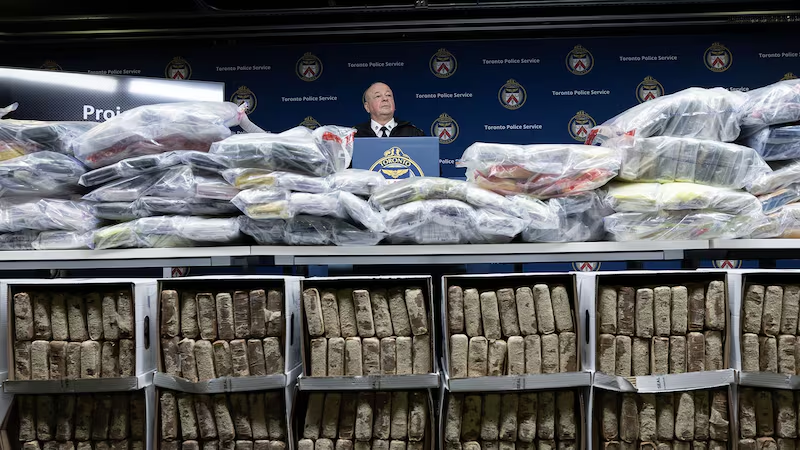OTTAWA -- Two former Conservative cabinet ministers -- Jay Hill and Jim Prentice -- were waiting for a flight at Toronto's Pearson airport that would take them sailing around a Caribbean island when they ran into two of their former colleagues still toiling as ministers.
The contrast was stark. The ex-ministers, joined later by former aboriginal affairs minister Chuck Strahl, were garrulously talking up the adventures that awaited. The two harried senior ministers still tethered to their BlackBerrys and briefing binders wistfully wished them well before rushing off to make their flights.
Who will be next to lift anchor from cabinet is the subject of feverish speculation in the lead-up to a major shuffle this season.
Prime Minister Stephen Harper has asked his ministers about their plans for the next election to better plan the team who will present policy to the voters in the scheduled 2015 vote. Faced with 41-year-old Liberal Leader Justin Trudeau and a young NDP front bench, much of the shuffle speculation has focused on generational change.
Harper is known for strategic tweaks of his cabinet, not complete overhauls.
"He places a very strong importance on having a team together that has a balance between experience and new blood. The fact is that these people have to be committed to running again at a certain point," said Hill, former Conservative House leader.
"I think the speculation is warranted. ... It's a logical timing for him to have a cabinet shuffle and to be quite blunt, and certainly that's his style, and on a one-on-one basis say 'Are you committed to running again next time? And if you're not, I'd better get in some people training for the job."'
Some of the possible departures that come up most in conversation with Conservatives include Public Safety Minister Vic Toews, Justice Minister Rob Nicholson, government whip Gordon O'Connor, Agriculture Minister Gerry Ritz, Fisheries Minister Keith Ashfield, junior minister Diane Ablonczy and even Finance Minister Jim Flaherty. Flaherty has insisted he is not leaving until he balances the budget, but he is also coping with a serious medical condition.
Some ministers are anxious to quell any speculation about their futures before it might begin. Joe Oliver, who turns 73 soon, said Friday he intends to run again in 2015.
"Yes, I definitely do and I've been saying that for some time now," he said.
"I feel very privileged to represent Eglinton Lawrence (riding) in Parliament and very privileged to be in the prime minister's cabinet. And I will be, of course, honoured to take on any assignment that he feels I should."
But most ministers are keeping their cards close to the vest.
Strahl, who joined Prentice and Hill on that Caribbean getaway, says there's a good reason for that -- it's still two years away from the next election, and people might not want to give up their jobs and the influence that comes with them just yet.
Former revenue minister Carol Skelton, for example, announced publicly she would not run again shortly before a cabinet shuffle in 2007, when a minority government made every day seem an election was around the corner. She wound up sitting on the backbench for another year-and-a-half.
Strahl told Harper he was going to retire from politics months before the 2011 election, but he said nothing publicly. Harper kept him on.
"You don't know what's going to come up. There might be a national-unity crisis you want to fight. Something might come up in your portfolio that you say is the most exciting chapter in a generation and you want to be in the middle of it," said Strahl, now an independent consultant.
"Anything might happen, so until you say the words in public, 'I'm not going to run again,' you might run again."
Strahl, Hill and fellow former minister Prentice were on that sailing trip around the island of Antigua for 10 days in February -- an unthinkable vacation for an over-scheduled minister.
Hill said he chose to retire on a high note back in 2010.
"I've often felt that politicians stay past their best-before date, and it's a common thing. ... They wait until they're on the downhill slide, in the tail-end of their career."
"Unfortunately in politics sometimes that can be pretty brutal because the people will make the decision for you. I often reminded myself that I wasn't in this thing for a lifelong track, which is difficult because it's pretty heady stuff sitting at a cabinet table."
Now a self-employed government relations adviser, Hill says he can see the signs of impending departure back in Ottawa.
"I highly suspect, if you just look at the ages of some of my former colleagues, it's time for some of them to move on," said Hill.
A major factor that could be at play with some veteran MPs is a new pension regime that will kick in after the next election.
Currently, MPs are eligible to receive their full pension at age 55, if they have been sitting for six years or more. After 2015, that penalty-free eligibility will get pushed to age 65. The return on the pensions will also be drastically reduced, while contributions by MPs will increase.
The motivation to leave before all these new rules hit could be huge. Besides the rules, though, there are life decisions to make.
"If you sign on, it's four more years. In my case, I was 55, so you're going to be pushing 60 when you get out," said Strahl.
"If you want to do some other things, if you want to have another career, it's decision time."
Both Hill and Strahl say there were other factors that weighed on them after so many years in politics.
"There's always family issues. In my case it's called 12 grandchildren," said Strahl.
"You just think, I missed more than I should have of my own kids' life, and it starts to bother you more for your grandchildren than it does for your own even."
Said Hill: "If you get to the point when you're not enjoying it more days than not, then it's time to go."























































































